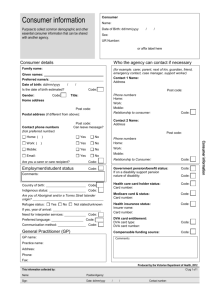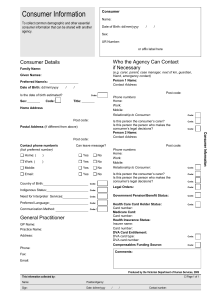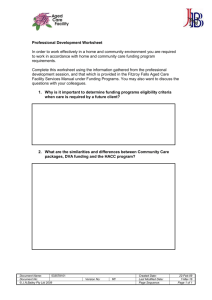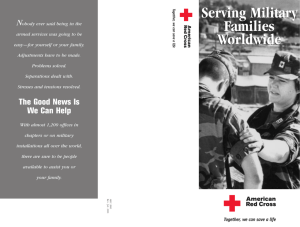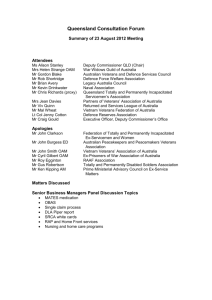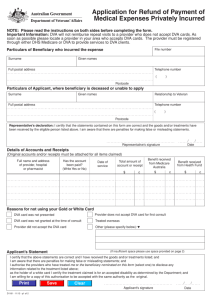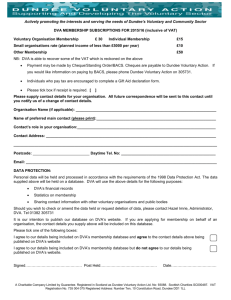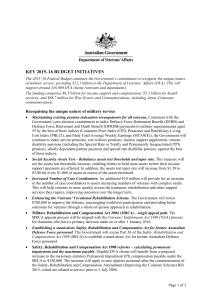Introduction Greetings We are rapidly approaching the end of yet
advertisement
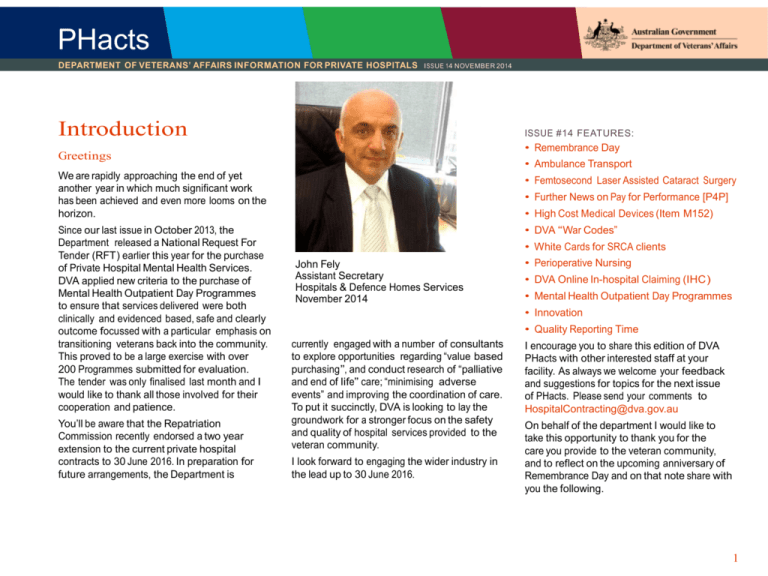
PHacts DEPARTMENT OF VETERANS’ AFFAIRS INFORMATION FOR PRIVATE HOSPITALS ISSUE 14 NOVEMBER 2014 Introduction ISSUE #14 FEATURES: • Remembrance Day Greetings • Ambulance Transport We are rapidly approaching the end of yet another year in which much significant work has been achieved and even more looms on the horizon. • Femtosecond Laser Assisted Cataract Surgery Since our last issue in October 2013, the Department released a National Request For Tender (RFT) earlier this year for the purchase of Private Hospital Mental Health Services. DVA applied new criteria to the purchase of Mental Health Outpatient Day Programmes to ensure that services delivered were both clinically and evidenced based, safe and clearly outcome focussed with a particular emphasis on transitioning veterans back into the community. This proved to be a large exercise with over 200 Programmes submitted for evaluation. The tender was only finalised last month and I would like to thank all those involved for their cooperation and patience. • DVA “War Codes” You’ll be aware that the Repatriation Commission recently endorsed a two year extension to the current private hospital contracts to 30 June 2016. In preparation for future arrangements, the Department is • Further News on Pay for Performance [P4P] • High Cost Medical Devices (Item M152) • White Cards for SRCA clients John Fely Assistant Secretary Hospitals & Defence Homes Services November 2014 • Perioperative Nursing • DVA Online In-hospital Claiming (IHC) • Mental Health Outpatient Day Programmes • Innovation • Quality Reporting Time currently engaged with a number of consultants to explore opportunities regarding “value based purchasing”, and conduct research of “palliative and end of life” care; “minimising adverse events” and improving the coordination of care. To put it succinctly, DVA is looking to lay the groundwork for a stronger focus on the safety and quality of hospital services provided to the veteran community. I look forward to engaging the wider industry in the lead up to 30 June 2016. I encourage you to share this edition of DVA PHacts with other interested staff at your facility. As always we welcome your feedback and suggestions for topics for the next issue of PHacts. Please send your comments to HospitalContracting@dva.gov.au On behalf of the department I would like to take this opportunity to thank you for the care you provide to the veteran community, and to reflect on the upcoming anniversary of Remembrance Day and on that note share with you the following. 1 PHacts DEPARTMENT OF VETERANS’ AFFAIRS INFORMATION FOR PRIVATE HOSPITALS ISSUE 14 NOVEMBER 2014 Remembrance Day Ambulance Transport Ambulance services are commonly used to transport DVA patients from private hospitals where the patient is: 1. discharged and is transported home or 2. transferred to another hospital or 3. is an inpatient and is provided with transport to another hospital or medical facility to receive treatment services that are not provided by the treating hospital and following the treatment is returned back to the originating private hospital. Such services include but are not limited to radiotherapy, dialysis, diagnostics and therapeutic treatment services. World War I began in 1914 and lasted for four years. More than 416 000 Australians volunteered for service in World War I. Of those, 324 000 served overseas. More than 60 000 Australians were killed, including 45 000 who died on the Western Front in France and Belgium, and more than 8000 who died on the Gallipoli Peninsula in Turkey. As well as Australian soldiers, many nurses in the Australian Army Nursing Service served on the Western Front. These nurses worked in overcrowded hospitals for up to 16 hours a day, looking after soldiers with shocking injuries and burns. Those who worked in hospitals close to the fighting were also in danger of being shelled by the enemy. In October 1997, the then Governor-General issued a Proclamation declaring 11 November as Remembrance Day – a day to remember the sacrifice of those who have died for Australia in wars and conflicts. As a mark of respect to those who have died and suffered, people in Australia are encouraged to stop what they are doing at 11am on Remembrance Day to observe one minute’s silence, and reflect on the loss and suffering caused by war. Lest we forget. If you would like to receive commemorative material for this year’s Remembrance Day commemoration you will need to send your order [including name and address of facility] to the DVA PHacts mailbox at: HospitalContracting@dva.gov.au In the first two circumstances DVA will usually accept financial responsibility for the ambulance transport. Where an air ambulance is required, discharge planners should contact DVA prior to arranging an air ambulance. DVA can be contacted on 133 254 for metropolitan callers or free call on 1800 555 254 for country callers. DVA will not accept financial responsibility for ambulance services that are used as described in the third circumstance. In these circumstances the private hospital is responsible for the costs of ambulance services. Where DVA is charged for the services as described in the third point DVA will seek to either recover the charges from the private hospital or refer the invoice for the services to the private hospital for payment. 2 PHacts DEPARTMENT OF VETERANS’ AFFAIRS INFORMATION FOR PRIVATE HOSPITALS ISSUE 14 NOVEMBER 2014 Femtosecond Laser Assisted Cataract Surgery DVA understands that some organisations have made a significant investment in Femtosecond Laser technology for cataract removal. In fact, the Department has received many requests from providers over recent years to fund this new procedure with an overwhelming number being declined. The use of the Femtosecond Laser for cataract surgery is not currently available on the Medicare Benefits Schedule, therefore any provider wishing to provide this treatment to DVA clients must continue to seek prior financial authorisation from DVA. In determining whether to fund femtosecond laser services, DVA is guided by the Royal Australian and New Zealand College of Ophthalmologists (RANZCO) statement on cataract surgery on their website which states: “The public can be reassured to know that the present technique of cataract removal through a tiny (microscopic) incision using phacoemulsification, followed by implantation of artificial IOL, remains the standard of care and is extremely efficient and safe. As new technology, there is no strong evidence that femtosecond laser surgery will be any safer yet it adds considerably to the cost of the procedure and prolongs the procedure.” DVA also notes the evidence for the efficacy of femtosecond laser assisted surgery in an assessment by the Health Policy Advisory Committee on Technology (HealthPACT) in February 2012 and the report (WP059) concluded: “There appears to be no significant clinical advantage over the use of the femtosecond lasers to remove cataracts in comparison to conventional phacoemulsification, especially when consideration is given to the high cost of the new technology. It would appear that the femtosecond laser technology for the removal of cataracts is rapidly diffusing in the private sector throughout Australia, however the technology is unlikely to impact on the public system in terms of patient flow and reduced waiting times for cataract surgery. There is a paucity of comparative evidence, in the form of randomised controlled trials, with the reported evidence to date conducted on relatively small patient groups.” www.health.qld.gov.au/ healthpact/html/tech-briefs.asp From DVA’s perspective, use of the femtosecond laser for cataract surgery cannot be regarded as clinically essential, as substantial evidence for increased safety and improved outcomes in cataract surgery is not yet available. Furthermore, DVA, through its funding arrangements, does not contribute towards costs associated with capital investments. We see the purchase of the femtosecond laser as a business decision, and as such, we are unable to contribute towards that cost. This policy is uniformly applied to all facilities who may approach the Department from time to time. Unless there is a strong clinical justification as to why the conventional procedure is not clinically appropriate, requests to DVA for prior financial authorisation for femtosecond laser assisted surgery will continue to be declined. 3 PHacts DEPARTMENT OF VETERANS’ AFFAIRS INFORMATION FOR PRIVATE HOSPITALS ISSUE 14 NOVEMBER 2014 Further News on Pay for Performance (P4P) The October 2013 edition of PHacts included an article about the DVA Patient Satisfaction Survey questionnaire, encouraging the distribution of the questionnaire to all DVA patients who have an overnight acute care, medical or surgical hospital admission. But wait…. There’s more! about questionnaire distribution or completion of the spreadsheet. ASR email: p4pdva@aussurveys.com ASR phone: 1800 001 154 ASR Fax: 03 9578 5311 Since its inception in 2009, the survey has been managed by AC Nielsen Research Pty Ltd. Following a nation-wide Request for Tender (RFT) process, the Department has now engaged the services of Australian Survey Research Group Pty Ltd (ASR) who took over the administration of the survey effective 17 February 2014. Hospitals that distribute the questionnaire receive comprehensive reports, including a breakdown of results against each question which is compared to the national average. The survey provides a valuable tool for identifying how patients feel about many aspects of their admission, highlighting what is being done well and potential areas for improvement. By now any acute, surgical or medical facility should have received a supply of the questionnaires produced by ASR and be distributing these. Any stock of Nielsen questionnaires should be destroyed. Hospitals are required to: • provide all overnight acute care patients receiving treatment under DVA arrangements with a copy of the questionnaire, preferably at the time of discharge; • record on the reporting spreadsheet provided by ASR the DVA number of the patient receiving the questionnaire, against the appropriate sequence number; • encourage veterans to fill in the survey, and return it within 2-3 weeks of their discharge; • send to ASR the reporting spreadsheet with the record of the questionnaires distributed by emailing p4pdva@ aussurveys.com by the 15th of each month; and • ensure ASR has the contact details of the staff person/s managing the survey at your hospital. Please use the ASR contacts below if you require additional supplies of the questionnaire or have any queries Additionally, 30% of your overall P4P score is attributed to the patient satisfaction results. Hospitals with less than 10% questionnaire distribution and return do not receive a score on the patient satisfaction domain. In the past, some hospitals have missed out on receiving a bonus payment because they have not been active in distributing and recording distribution of the questionnaire. Hospitals that have been distributing the Patient Satisfaction Survey recently had the opportunity to complete a survey to assist DVA in assessing the current Pay for Performance arrangements and to explore opportunities for development and improvement to the programme. The survey was distributed by Health Outcomes International (HOI). Results are currently being analysed and recommendations will be delivered to DVA in the near future. Feedback to DVA about Pay for Performance is also welcome at any time. Email: PayforPerformanceP4P@dva.gov.au High Cost Medical Devices (Item M152) Since the last newsletter there have been some changes made to the claiming rules surrounding Item M152. DVA will now meet the costs associated with the use of High Cost Medical Devices (HCMD) where it is considered not reasonably included in the theatre fees. As a guide, items valued at $250 or less would not generally be considered high cost. M152 should only be used in exceptional circumstances as all disposable and consumable items are considered to be included in the theatre fee payable for the procedure. All claims made under Item M152 for $250 and below will be rejected with the following reason - ‘Item included in theatre fees’. The effective date is 1 February 2014. If you have any queries regarding this please contact your DVA Contract Manager. 4 PHacts DEPARTMENT OF VETERANS’ AFFAIRS INFORMATION FOR PRIVATE HOSPITALS ISSUE 14 NOVEMBER 2014 DVA War Codes Recent compliance activities undertaken by the Private Hospitals Contracting team has revealed some confusion amongst hospitals in identifying veterans from overseas conflicts. To assist you in this regard, a list of “War Codes” assigned to various conflicts has been provided below. The “War Code” is a prefix to the veteran’s file number and immediately follows a state identifier. For example, a British Merchant Seaman 1939 living in Victoria would have the DVA file number: VPSW 12345. WAR CODE CONFLICT WAR CODE CONFLICT WAR CODE CONFLICT A AGX BUR BW CGW CIV CN CNK CNS CNX FIJ GHA GW HKS HKX IND IV KM KYA MAL MAU MLS MTX MWI N NF NG NGR NK NRD NSM NSS NSW NX P PAD PAM PCA PCR PCV PK PMS PSM PSW PWO PX Q RD RDX SA SAX SL SM SR SS SUD SWP TZA X ZZ Allied Forces Act of Grace 1939 Burma Boer War Commonwealth Gulf War Civilians Canadian Forces 1914 Canada Korea/Malaya Canada Special Overseas Service Canadian Forces 1939 Fiji Ghana Australian Gulf War Hong Kong (SP Eligibility) Hong Kong 1939 India Indigenous Veteran 1939 Korea-Malaya Kenya Malaya-Singapore Mauritius Malaysia – Singapore SP Eligibility Malta 1939 Malawi New Zealand 1914 Newfoundland New Guinea Civilian War Pension Nigeria New Zealand Korea-Malaya Northern Rhodesia New Zealand Serving Members New Zealand Special Overseas Service New Zealand Merchant Navy New Zealand 1939 British Pension 1914 British Admiralty Pension British Air Ministry Pension Governments and Administration British Service Department – CRO British Pension Civilian British Korea/Malaya British Merchant Seaman 1914 British Serving Members British Merchant Seaman 1939 British War Offices Pension British Pension 1939 Query Southern Rhodesia 1914 Southern Rhodesia 1939 South African Forces 1914 South African Forces 1939 Sierra Leone Serving Member Far East Strategic Reserve Special Overseas Act Sudan Seamans War Pension 1939 Tanganyika (Tanzania) Australian Forces 1939 Zanzibar 5 PHacts DEPARTMENT OF VETERANS’ AFFAIRS INFORMATION FOR PRIVATE HOSPITALS White Cards for SRCA clients The changes to billing arrangements for clients under DVA’s Safety Rehabilitation and Compensation Act 1988 (SRCA) are now in effect. DVA clients under SRCA with long term treatment needs have now been issued with a DVA Health Card (White Card). WHAT DOES THIS MEAN FOR HOSPITALS? • SRCA clients will use their White Card (or Gold Card if they already have one) to access hospital treatment in the same way as other Entitled Persons. • The hospital service provider must bill DHS (Medicare) directly for the accepted health care services using the White Card. ISSUE 14 NOVEMBER 2014 DVA Online In-hospital Claiming [IHC] ARE YOU AWARE YOU CAN MAKE CLAIMS ONLINE W ITH DVA? Claiming online allows Private Hospitals and Day Procedure Centres to lodge claims directly with DHS (Medicare). This includes claims for: • accommodation; • theatre; • prosthetics; and • miscellaneous services. WHAT ARE THE BENEFITS TO YOUR ORGANIZATION? • Error free claims processed in seconds and payments lodged into your facility’s nominated bank account within 3 days • Electronic remittance advices available as soon as your claim is processed and paid • Rejected claims can be corrected and resubmitted in real time Perioperative Nursing DVA has recently received invoices from private hospitals seeking payment for the services of perioperative nurses assisting in theatre. Please note that charges for any inpatient nursing services are included under the Inpatient Charges of your Hospital Services Agreement. DVA does not pay separately for these services. Consequently these charges should not be levied on veterans under any circumstances. • Use of an Online Veteran Verification facility that allows you to check immediately if a patient is known to DVA LIKE TO FIND OUT MORE? Just visit: www.humanservices.gov.au/health-professionals/ or telephone DHS - Medicare ebusiness on 1800 700 199 6 PHacts DEPARTMENT OF VETERANS’ AFFAIRS INFORMATION FOR PRIVATE HOSPITALS ISSUE 14 NOVEMBER 2014 New Purchasing Arrangements for Mental Health Hospital Services Mental health is a priority for DVA. The Department wants to purchase services for its clients that are accessible, evidence based and will deliver the best prospects for recovery from mental illness and for ongoing good mental health. In its 2014 Tender for Private Mental Health Hospital Services, DVA took a new approach to how it is purchasing mental health hospital services. Specifically, this included a focus on purchasing evidence based outpatient day programmes. Requirements for these programmes are set out in the Clinical Guidelines for Mental Health Outpatient Day Programmes which are available from DVA on request. As a result of the tender, DVA has contracted 18 entities, covering 59 facilities, to provide a range of quality acute care services and: • 86 outpatient day programmes; • 11 trauma recovery programmes – Posttraumatic Stress Disorder; and • 11 ‘innovative’ programmes. DVA will no longer pay for new hospital based outpatient day programmes that are not evidence based, best practice clinical interventions. Examples of such programmes include: • stand alone adjunct therapy such as art therapy; • social, recreational or psychosocial support open ended day programmes; and • health and fitness programmes. DVA will continue to fund such programmes for clients who were still participating as at 30 June 2014 to ensure no DVA client is adversely affected. DVA will not, however, pay for new entrants to these programmes. For further information, contact your DVA contract manager. Innovation DVA is very keen to explore opportunities for innovation in the provision of health care to Entitled Persons that reflect the changing health needs of the veteran population. Examples could include services related to in-home palliative care and dedicated hospital based inpatient treatment/accommodation of patients suffering from dementia or Alzheimer’s Disease. Alternatively you may consider an innovative response to the needs of younger veterans as they navigate the health system at a time when they are transitioning from their defence service while rehabilitating from their service-related injuries. A particular focus of DVA’s is Palliative and End of Life Care; Improving the Coordination of Care and Minimising Adverse Events. In developing proposals, you should refer to the Guidelines for proposals for the provision of hospital-based programs for DVA entitled persons, which are available at: www.dva.gov.au/service_providers/hospitals/veteran_ partnering/Documents/Guidelines_for_proposals_ for_hospital.pdf QUALITY REPORTING TIME Just a gentle reminder that Quality Reports are required to be submitted to the Department within four (4) months of the end of each twelve month period from 1 July to 30 June for the life of your Agreement. The next report is therefore due by 31 October 2014. 7
